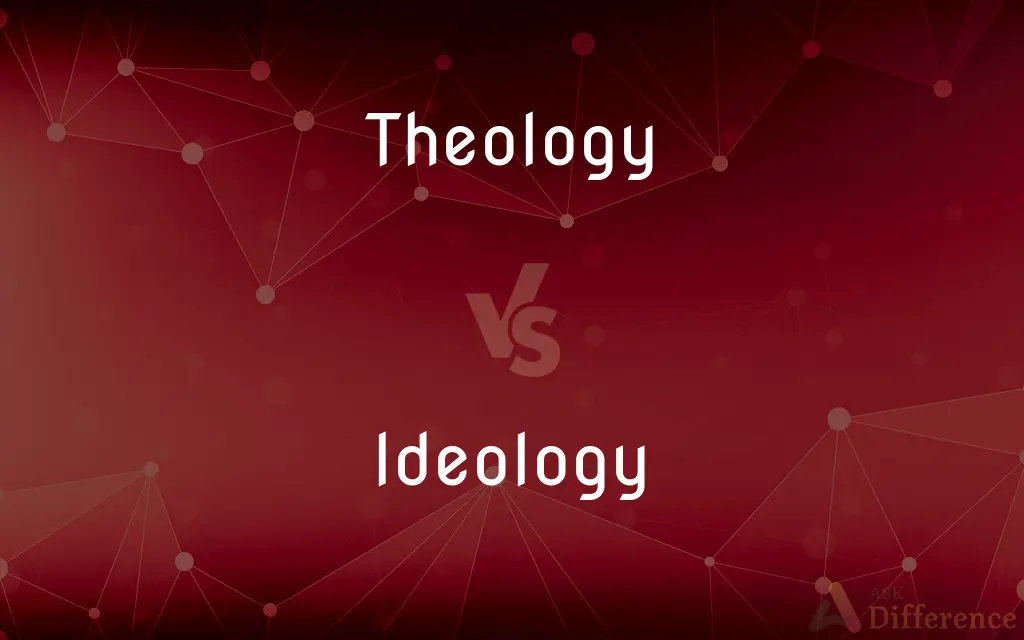Theology vs. Ideology — What's the Difference?
By Tayyaba Rehman & Maham Liaqat — Updated on April 19, 2024
Theology deals with the study of divine entities and religious beliefs, while ideology concerns broader systems of ideas that influence social attitudes and behaviors.

Difference Between Theology and Ideology
Table of Contents
ADVERTISEMENT
Key Differences
Theology primarily explores the nature of the divine and religious experience, examining concepts like God, spirituality, and the afterlife. Whereas, ideology encompasses a wider range of beliefs, including political, social, and economic theories that shape societal structures.
Theology often relies on sacred texts and religious traditions as its sources, seeking to understand and interpret divine will and moral laws. On the other hand, ideology is typically based on secular philosophies and can be derived from cultural, political, or economic movements.
In theology, discussions frequently center around moral and ethical implications of religious teachings, aiming to guide adherents in their personal and communal lives. Ideology, however, often focuses on societal change and development, proposing systems that aim to organize and govern community life.
Theologians typically engage in debates that interpret religious texts and doctrines, which can vary significantly across different religions. Conversely, ideologists may debate the merits and applications of various ideologies like capitalism, socialism, or democracy, impacting broader societal organization.
Theology and ideology both influence individual and collective behaviors, but their approaches differ significantly. Theology usually appeals to spiritual authority and tradition, while ideology often roots itself in rationality and contemporary socio-political thought.
ADVERTISEMENT
Comparison Chart
Definition
Study of divine and religious beliefs
Set of beliefs that influence social structures
Source of Beliefs
Sacred texts and religious traditions
Secular philosophies and political movements
Main Focus
Divine nature, spirituality, moral laws
Political, social, economic theories
Purpose
Provide spiritual guidance and moral direction
Organize and influence societal systems
Types of Discussions
Interpretations of religious texts, moral implications
Debates on societal organization, policy impacts
Compare with Definitions
Theology
The study of the nature of God and religious belief.
He pursued a degree in theology to deepen his understanding of divine matters.
Ideology
The set of beliefs characteristic of a social group or individual.
His ideology was shaped by his experiences and historical context.
Theology
A system of religious beliefs or ideas.
Christian theology is heavily influenced by the teachings of Jesus and the Bible.
Ideology
The body of doctrine, myth, belief, etc., that guides an individual, social movement, institution, class, or large group.
Socialist ideology seeks to reduce wealth disparities through state intervention.
Theology
Religious beliefs and theory when systematically developed.
Theology can sometimes intersect with philosophical inquiries about existence.
Ideology
A systematic body of concepts especially about human life or culture.
The ideology underpinning this policy aims to improve overall societal welfare.
Theology
The study of religious faith, practice, and experience, especially the study of God and God's relation to the world.
Theology often involves scholarly analysis of religious texts.
Ideology
A system of ideas and ideals, especially one that forms the basis of economic or political theory and policy.
The ideology of democracy advocates for freedom and equality among citizens.
Theology
The rational and systematic study of religion and its influences and of the nature of religious truth.
Theology examines the conflicts and harmonies between faith and reason.
Ideology
A widespread societal belief system that influences attitudes towards people and events.
Capitalist ideology often emphasizes individual success and competition.
Theology
Theology is the systematic study of the nature of the divine and, more broadly, of religious belief. It is taught as an academic discipline, typically in universities and seminaries.
Ideology
An ideology (/ˌʌɪdɪˈɒlədʒi/) is a set of beliefs or philosophies attributed to a person or group of persons, especially as held for reasons that are not purely epistemic, in which "practical elements are as prominent as theoretical ones." Formerly applied primarily to economic, political, or religious theories and policies, in a tradition going back to Karl Marx and Friedrich Engels, more recent use treats the term as mainly condemnatory.The term was coined by Antoine Destutt de Tracy, a French Enlightenment aristocrat and philosopher, who conceived it in 1796 as the "science of ideas" to develop a rational system of ideas to oppose the irrational impulses of the mob. In political science, the term is used in a descriptive sense to refer to political belief systems.
Theology
The study of the nature of God and religious truth; rational inquiry into religious questions.
Ideology
A set of doctrines or beliefs that are shared by the members of a social group or that form the basis of a political, economic, or other system.
Theology
A system or school of opinions concerning God and religious questions
Protestant theology.
Jewish theology.
Ideology
Doctrine, philosophy, body of beliefs or principles belonging to an individual or group.
A dictatorship bans things, that do not conform to its ideology, to secure its reign.
Theology
A course of specialized religious study usually at a college or seminary.
Ideology
(uncountable) The study of the origin and nature of ideas.
Theology
(uncountable) The study of God, a god, or gods; and of the truthfulness of religion in general.
Ideology
The science of ideas.
Theology
(uncountable) religious studies
Ideology
A theory of the origin of ideas which derives them exclusively from sensation.
Theology
(countable) An organized method of interpreting spiritual works and beliefs into practical form.
Ideology
A set or system of theories and beliefs held by an individual or group, especially about sociopolitical goals and methods to attain them; in common usage, ideology is such a set of beliefs so strongly held by their adherents as to cause them to ignore evidence against such beliefs, and thus fall into error - in this sense it is viewed as a negative trait; contrasted to pragmatism, and distinct from idealism.
Theology
(countable) A particular belief within a religion.
Ideology
An orientation that characterizes the thinking of a group or nation
Theology
Subjective marginal details.
Ideology
Imaginary or visionary theorization
Theology
The science of God or of religion; the science which treats of the existence, character, and attributes of God, his laws and government, the doctrines we are to believe, and the duties we are to practice; divinity; (as more commonly understood) "the knowledge derivable from the Scriptures, the systematic exhibition of revealed truth, the science of Christian faith and life."
Many speak of theology as a science of religion [instead of "science of God"] because they disbelieve that there is any knowledge of God to be attained.
Theology is ordered knowledge; representing in the region of the intellect what religion represents in the heart and life of man.
Theology
The rational and systematic study of religion and its influences and of the nature of religious truth
Theology
A particular system or school of religious beliefs and teachings;
Jewish theology
Roman Catholic theology
Theology
The learned profession acquired by specialized courses in religion (usually taught at a college or seminary);
He studied theology at Oxford
Common Curiosities
Can theology and ideology intersect?
Yes, they can intersect when religious beliefs significantly influence political and social systems.
Which is broader, theology or ideology?
Ideology is broader, encompassing not only political but also social and economic theories.
What is the main purpose of studying theology?
The main purpose is to understand divine nature and provide spiritual and moral guidance.
How does theology differ from ideology in source material?
Theology is based on sacred texts and religious traditions, while ideology draws from secular sources like political theories and cultural movements.
Does theology only concern Christianity?
No, theology pertains to all religions, each having its own theological studies, like Islamic theology or Hindu theology.
How do ideologies impact society?
Ideologies shape societal norms, policies, and structures, influencing how communities are organized and governed.
What role does ideology play in elections?
Ideology heavily influences political platforms and voter preferences during elections.
Are ideologies inherently political?
While closely associated with politics, ideologies can also encompass broader social and economic dimensions.
What is practical theology?
Practical theology involves applying theological insights to real-life situations and practices within a religious community.
Can someone study ideology academically?
Yes, ideologies can be studied in academic fields like political science, sociology, and cultural studies.
How do theologians conduct their studies?
Theologians often engage in textual analysis, historical context examination, and interpretive debate.
What is a political ideology?
A political ideology is a set of ethical ideals, principles, doctrines, myths, or symbols of a social movement that explains how society should work.
How does one become a theologian?
Typically, becoming a theologian requires advanced academic study in theology, often at a seminary or university.
Is theology considered a science?
Theology is often considered a science in the context of religious studies, as it applies systematic approaches to the study of divine phenomena.
Can ideologies be harmful?
Yes, when ideologies become extreme or oppressive, they can lead to social divisions and conflicts.
Share Your Discovery

Previous Comparison
Coat vs. Blazer
Next Comparison
Ronin vs. SamuraiAuthor Spotlight
Written by
Tayyaba RehmanTayyaba Rehman is a distinguished writer, currently serving as a primary contributor to askdifference.com. As a researcher in semantics and etymology, Tayyaba's passion for the complexity of languages and their distinctions has found a perfect home on the platform. Tayyaba delves into the intricacies of language, distinguishing between commonly confused words and phrases, thereby providing clarity for readers worldwide.
Co-written by
Maham Liaqat















































